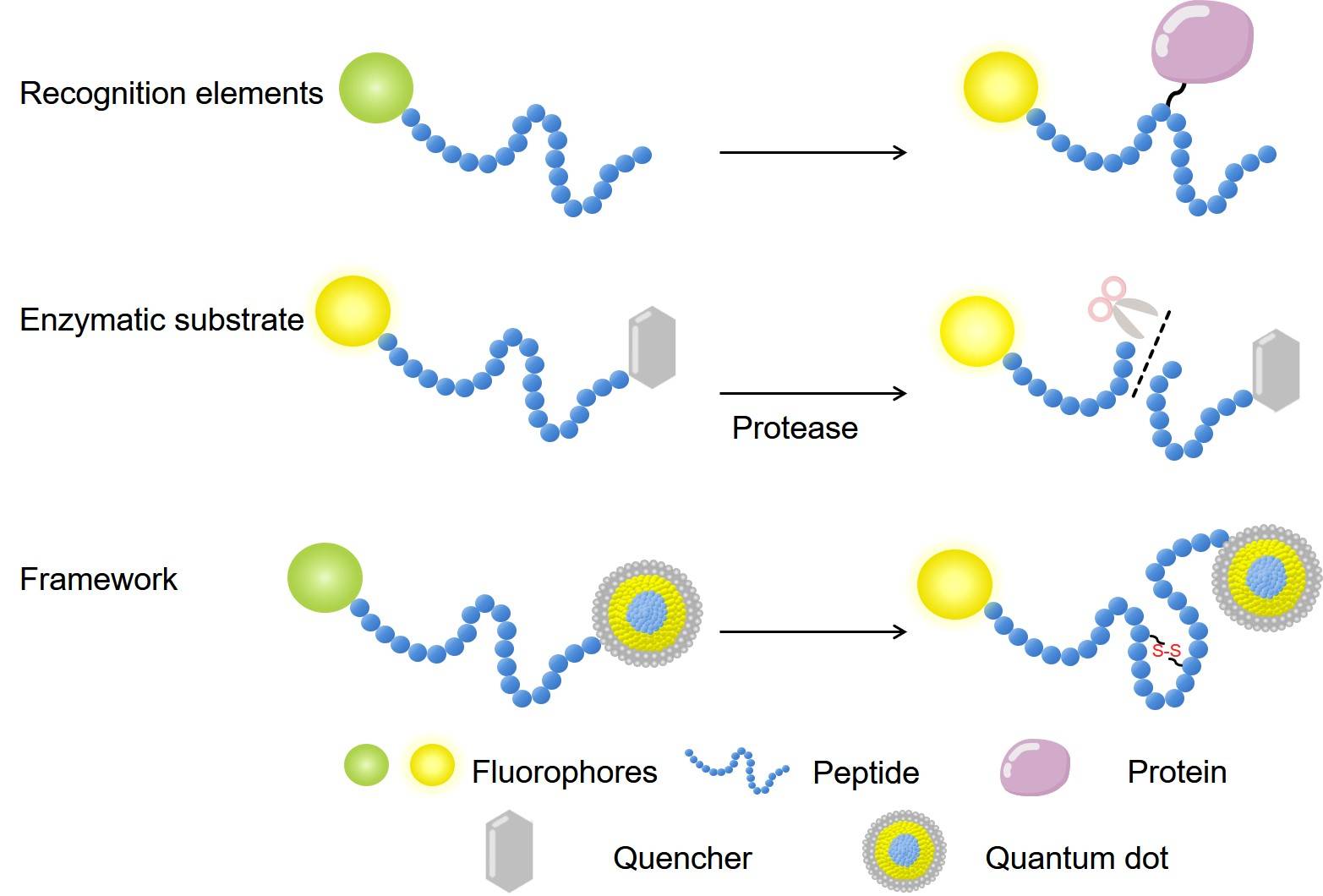Bioconjugation for Biochemical Assays
Biochemical assays, as one of the primary techniques of chemical research, are critical in clinical diagnosis, food safety, environmental testing, and biochemistry development. Creative Biolabs provides advanced technology allows for precise and efficient conjugation, ensuring accurate and reliable results. With our expertise in this area, we're the perfect fit for your biochemical analysis needs.
Bioconjugated Peptides to Construct Biosensors
In biochemistry, we can utilize sensors specifically to detect certain signals and stimuli in order to offer quantitative or semi-quantitative analytical information. Based on the structural diversity of peptides, their high affinity to proteins, their well-established manufacturing procedures, and modification methods, jointly make them a powerful means for us to construct outstanding biosensors. We achieved this goal by using peptides as receptors (biorecognition element), enzyme substrates (linker) and frameworks (scaffold) in peptide-based biosensors.
 Fig. 1 Peptide Function in Biosensors.
Fig. 1 Peptide Function in Biosensors.
Peptides as Recognition Elements in Biosensors
The biorecognition element is critical to ensuring biosensor specific detection. When attached to analytes, peptides do not straightaway create quantifiable signals. Therefore, we conjugate peptides to signaling markers to convert analyte information into quantifiable signals. We use fluorophores, near-infrared dyes, nanoparticles, quantum dots, graphene, lanthanide chelators and electrochemical markers as signaling markers. In this way, we are able to make a range of peptide-conjugated probes/sensors to meet your quantitative needs for analytes such as proteins, antibodies, metal ions, nucleic acids, and more.
Peptide-based Protein Sensors
Based on bioconjugation, we can prepare peptide-based protein biosensors. Protein sensors have been created by conjugating with fluorophores, liposomes, and electrochemical platforms. Because of their low molecular weight, in vivo imaging, and quick in vitro detection, peptide-based sensors have an advantage over protein-based sensors.
Peptide-based Metallic ion Sensors
We can prepare peptide-based metallic ion sensors. Metallic ion sensors may be made by conjugating peptides with signaling markers such as fluorophores and gold nanoparticles, such as Zn (II), Cu (II), Hg (II), Cd (II), Ca (II), Mg (II), Na(I), K(I), Mn (II), Co (II), Al (III), Ni (II), Pb (II), and Ag(I).
Peptide-based Nucleic Acid and Other Sensor
We can prepare peptide-based nucleic acid and other sensor. Specialized peptides with high affinity for nucleic acids can be synthesized using DNA-binding proteins or transcription factors. We construct nucleic acid sensors by conjugating such special peptides to signaling markers like fluorophores. Furthermore, we can use the counterion substitution approach of peptides to identify heparin impurities.
Peptides as Enzymatic Substrate in Biosensors
Peptides can serve as substrates for enzyme activity sensors and are significant substrates for proteases and kinases. In order to convert enzymatic information into quantifiable signals, we conjugate signaling markers on the peptide substrates. Proteases precisely and effectively cut peptides at predetermined sites, changing the conjugated signaling marker to transmit information. When fluorophores are conjugated with peptides to create self-reporting kinase sensors, kinases quench them upon recognizing the tyrosine residues in the peptides.
Peptides as Framework in Biosensors
Short peptide sequences are very adaptable and may be folded into biosensor frameworks. Based on the redox properties of cysteine residues, we can provide you with peptide-based redox sensors, peptide-based cyclodextrin sensors, and so on.
![]()
Biochemical Assays Services of Bioconjugation at Creative Biolabs
Creative Biolabs offers the most advanced and comprehensive bioconjugation services to support your biochemical analysis. We work to amplify your success in a highly collaborative manner. If you are interested in our services, please do not hesitate to contact us for detailed information.
